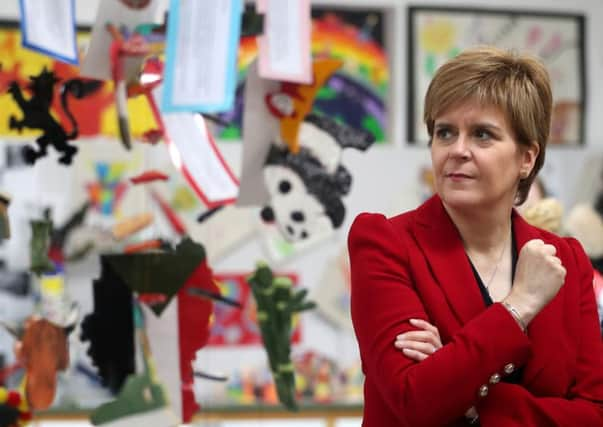Scottish private schools face £5m business rate tax hike


A review into the levy commissioned by the Scottish Government has called for an end to the arrangement that sees private schools excused from the levy courtesy of their charitable status.
Universities which rent out accommodation outside term time should also be eligible for rates, said the report by former RBS chairman Ken Barclay.
Advertisement
Hide AdAdvertisement
Hide AdThe review has been taking place while Scottish businesses, particularly those in the hospitality sector, have expressed outrage over a huge hike in business rates earlier this year.
Although some of the reforms were welcomed as a step in the right direction by business organisations, fears remained that many firms could still face difficulties next March when the 15 per cent real terms rates rise cap expires.
The Scottish Council of Independent Schools said ending private schools’ exemptions would cost the Scottish taxpayer and have “serious consequences” for staff and the 30,000 pupils taught in the sector.
Parents of privately educated children were warned that they could face fee increases if the government adopts the recommendations.
A 135-page document prepared by Mr Barclay said the schools measures would bring in £5 million a year. Education insiders said around 60 fee-paying schools would be affected. The amount they would have to pay will vary, but large secondary schools with a lot of property could be looking at a bill of up to £500,000 a year.
Mr Barclay’s proposals, which are “revenue-neutral”, would see new-build property and expanding businesses benefit from a year-long tax break from raising business rates – a measure that would cost £45 million a year. Among the 30 recommendations were a proposal for three yearly revaluations from 2022 based on market conditions.
Further recommendations include halving the large business supplement, which is paid by firms with properties with a rateable value of more than £51,000, from 2.6 per cent to 1.3 per cent, to bring it into line with England.
More cash for town centres was accompanied by a new relief for day nurseries to support childcare provision which would cost £7m a year.
Advertisement
Hide AdAdvertisement
Hide AdMr Barclay also suggested a drive to close tax avoidance loopholes on second and empty properties – a measure calculated to bring in around £21m a year.
On the proposal that would affect private schools, the report acknowledged that an overhaul of charity relief was “controversial” but necessary to increase fairness.
Also affected would be so-called arm’s-length external organisations (ALEOs) which are often created to run councils’ leisure facilities.
The report claimed ALEO charitable status gave them an “unfair advantage” over private sector businesses offering similar services and said they should have to pay business rates.
Commercial elements of universities, such as halls of residence rented outside term time, should also be liable.
Rates relief for sports clubs should be reviewed to ensure they support affordable community-based facilities rather than private members’ clubs – a proposal that will affect many golf clubs.
Yesterday John Edward, director of the Scottish Council of Independent Schools, said: “The findings of the Barclay Review run completely contrary to the charity test the Scottish Parliament required all schools to undertake; would put Scottish education at a competitive disadvantage in the UK and globally; would substantially impact the work schools can do on offering bursaries and other community provision; and would set independent schools aside from all other charities – for no sound legal, political, educational or economic reason.
Advertisement
Hide AdAdvertisement
Hide Ad“Most of all, for a rates review, they would most likely cost the Scottish taxpayer and Government more than they seek to raise.
“A review of business rates should not be used to single out 0.3 per cent of Scotland’s charities for differential treatment, when the exception to the rule is not the independent school sector – rather the council-run one.”
At the start of the year the Scottish Government came under fire from business over the first rates revaluation for seven years. Businesses complained they would go to the wall when their tax bills went up by thousands of pounds.
In response to the outcry, the government imposed a 15 per cent cap on increases for hospitality firms.
Last night the Scottish Conservatives voiced concern at what would happen to businesses once the cap runs out.
Shadow finance secretary Murdo Fraser said: “Many firms will feel this is tinkering round the edges of a broken system, rather than the fundamental overhaul that’s required.
“The hospitality sector ... will be worried that history will repeat itself next year.
“If that industry is hit with the kind of increases suggested last time, it would almost certainly mean the closure of businesses and job losses.
Advertisement
Hide AdAdvertisement
Hide Ad“Proposals around independent schools and sports clubs will also have alarm bells ringing in those sectors.”
Mr Barclay said: “Ratepayers providing the same goods or services should not be treated any differently because of their location or by virtue of them operating in the public or private sector.
“We have also highlighted unfair advantages gained by anomalies within the system, and of those who deliberately avoid payment of tax. Neither is fair.”
His proposals were welcomed by Finance Secretary Derek Mackay, who said: “This report offers recommendations for reform of the system to make it work better for ratepayers across Scotland, while ensuring that the contribution they make to important local services is maintained.”